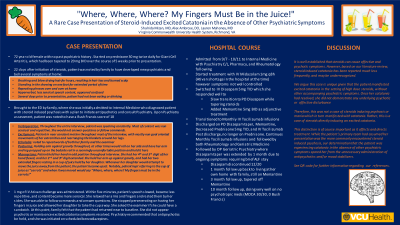Catatonia
Session: Poster Session
(019) Where, Where, Where? My Fingers Must Be in the Juice: A Rare Look into Steroid-Induced Excited Catatonia in the Absence of Other Psychiatric Symptoms

Trainee Involvement: Yes
- SM
Shahida Mizan, MD
Resident Physician
Virginia Commonwealth University Health System
Richmond, Virginia, United States - LA
L Alex Ambrose, DO
Fellow
VCUHS
Richmond, Virginia, United States - LM
Lauren Mahoney, MD
Attending CL Psychiatrist
Virginia Commonwealth University Health System
Richmond, Virginia, United States
Presenting Author(s)
Co-Author(s)
In the rare cases when catatonia presents as a side effect of steroids, it is usually in the context of other psychiatric side effects such as psychosis or mania. This case is a rare presentation of steroids inducing catatonia in the absence of any other psychiatric symptoms. Warrington, T. P., & Bostwick, J. M. (2006). Psychiatric adverse effects of corticosteroids. Mayo Clinic Proceedings, 81(10), 1361–1367. https://doi.org/10.4065/81.10.1361 Zagaria, M.A.E. (2016). Systemic corticosteroid–associated psychiatric adverse effects. U.S. Pharmacist – The Leading Journal in Pharmacy. Retrieved November 18, 2022, from https://www.uspharmacist.com/article/systemic-corticosteroidassociated-psychiatric-adverse-effects Dada, M. U., Oluwole, M. U., Obadeji, A., & Ajayi, O. A. (2011). Dexamethasone induced psychosis presenting with catatonic features. African Journal of Psychiatry, 14(4). https://doi.org/10.4314/ajpsy.v14i4.10
Background: This is the case of a patient with no past psychiatric history who presented with excited catatonia, but no other psychiatric symptoms, after being treated with high dose steroids. To our knowledge there are no other cases in the literature in which corticosteroids have directly induced catatonia in the absence of psychotic or mood symptoms.
Case: Ms. S is a 72 year old female with no past psychiatric history who presented for bizarre behaviors. At home, she had been noted by family to demonstrate frequent verbigeration, posturing and stereotypies over the preceding weeks. These behaviors developed soon after she had been initiated on high dose steroids for treatment of temporal arteritis (TA). She otherwise had no significant past medical history. Upon assessment by CL Psychiatry, she was given the diagnosis of excited catatonia as she demonstrated extreme hyperactivity with posturing/catalepsy, echolalia, mannerisms, and verbigeration. A lorazepam challenge was administered upon which nearly all of her symptoms resolved. Notably, upon resolution of her catatonia, she did not demonstrate any psychotic or manic symptoms. She was admitted to the internal medicine service and maintained on scheduled benzodiazepines and memantine while her TA treatment was changed from prednisone to an alternative, Tocilizumab. After cessation of her prednisone, her benzodiazepines were tapered off slowly without recurrence of catatonia. At no point did she require treatment with antipsychotics or mood stabilizers.
Discussion: Corticosteroid therapy has been frequently associated with adverse psychiatric effects which range from mood swings and insomnia to severe affective illness and psychosis (Mary Ann E. Zagaria, 2016). The most common adverse effects of short-term administration are euphoria and hypomania. Long-term corticosteroid administration has been more commonly associated with depression (Warrington & Bostwick, 2006). There are currently limited reports of steroids causing catatonia, with many cases being attributed to psychosis or a mood disorder with catatonic features. Our case details a patient who developed excited catatonia secondary to treatment with high dose prednisone. She otherwise did not demonstrate any psychotic, manic, or mood symptoms. Therefore, her catatonia was not secondary to another psychiatric side effect of the steroids. Based on our literature review, we argue that this case is noteworthy and important as we have not found any other documented cases of steroids inducing a catatonic presentation in the absence of any other psychiatric symptoms.
Conclusion:
References:

